Baralla es un municipio español de la provincia de Lugo en Galicia. Hasta finales de la década de los 70 se llamaba Neira de Xusá o Neira del Rey.
En su origen, fue un poblado celta que se romanizó completamente con la fundación de la ciudad de Lugo.
Baralla is a Spanish municipality in the province of Lugo in Galicia. Until the late 1970s it was called Neira de Xusá or Neira del Rey.
It was originally a Celtic settlement that was completely Romanized with the founding of the city of Lugo.
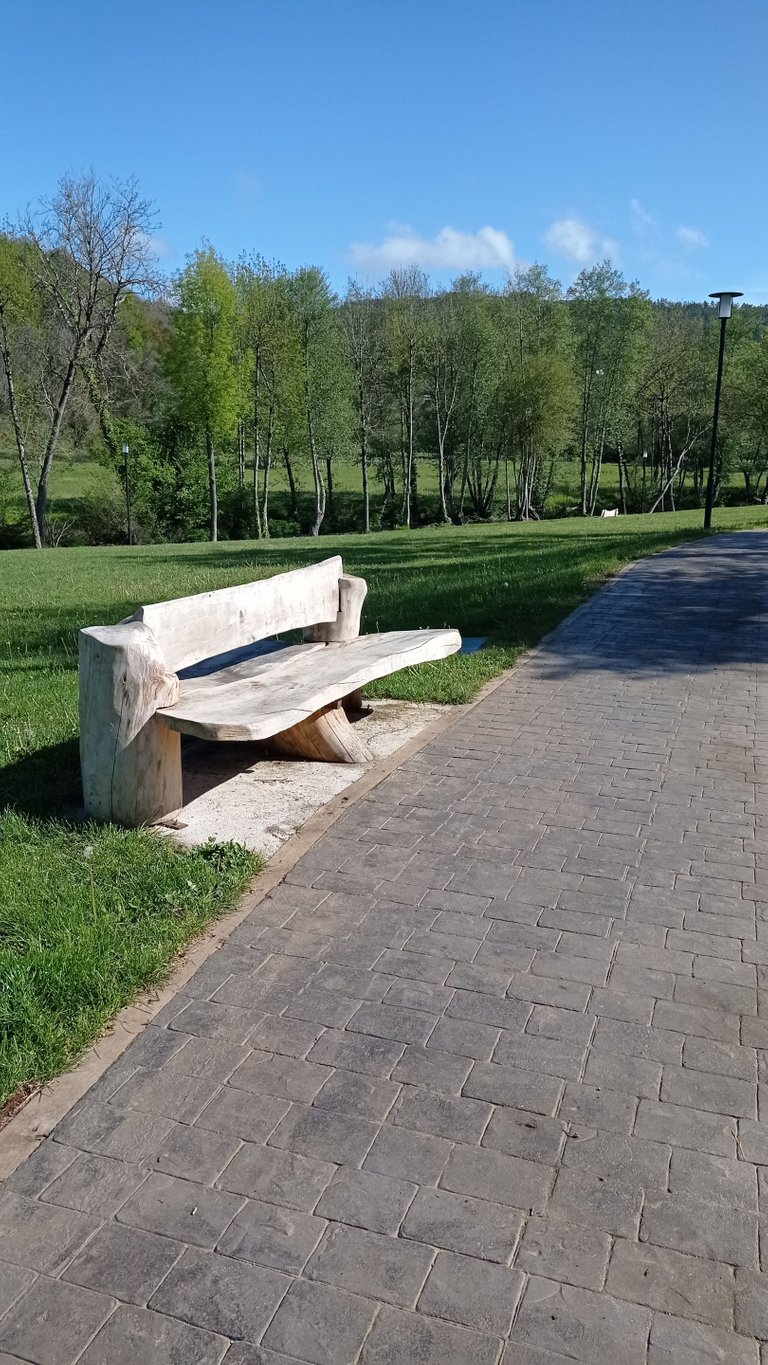
Parque fluvial Baralla/Baralla River Park
Fiestas del pueblo
- San Vitorio, el 27 de agosto. Las celebraciones duran entre 4 y 5 días, siendo habituales el 26, 27, 28 y 29. Se hacen conciertos, hay puestos de comida, atracciones infantiles, misas, entre otras actividades.
Baralla Festivals
- San Vitorio, on August 27th. The celebrations last between 4 and 5 days, usually on the 26th, 27th, 28th and 29th. There are concerts, food stalls, children's attractions, masses, among other activities.
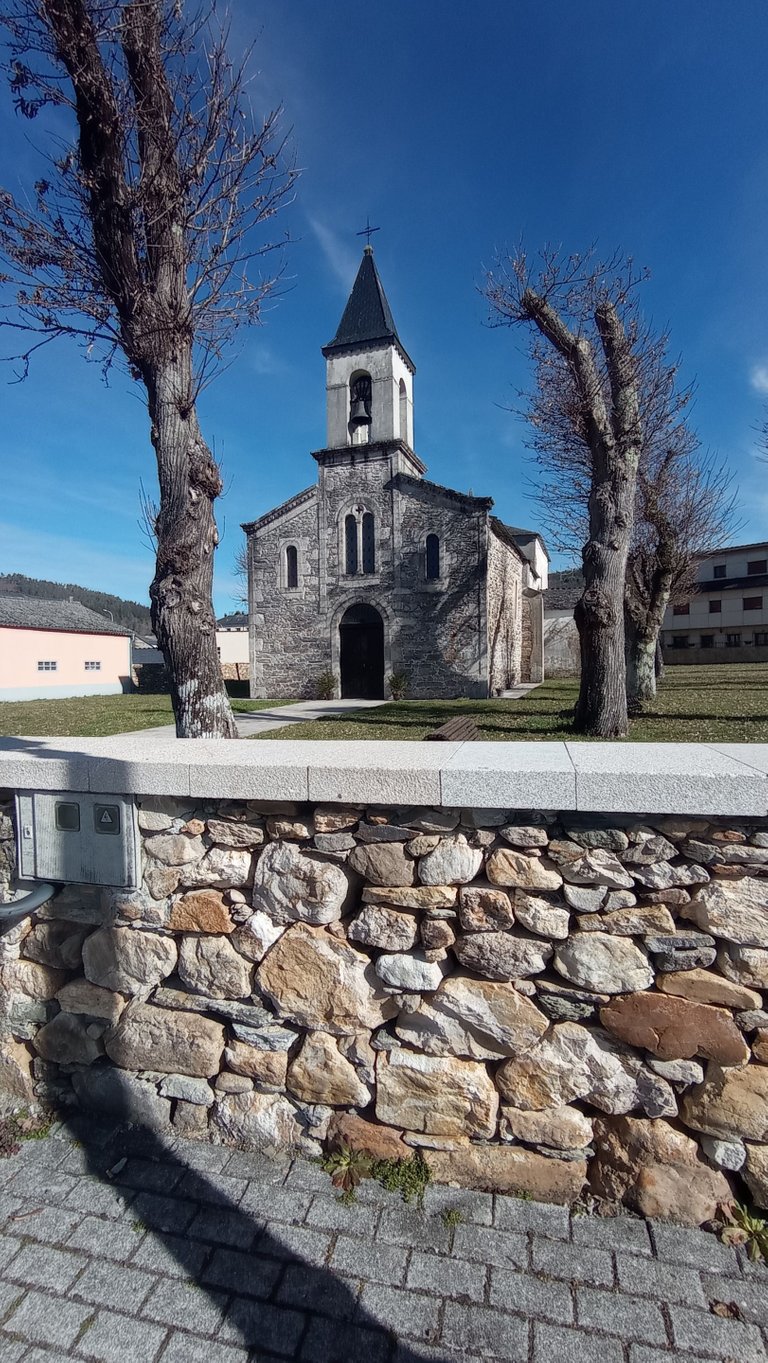
Iglesia Santa Mª Magdalena donde se celebran las misas de San Vitorio/St. Mary Magdalene Church where the masses of St. Vitorio are celebrated.
- Anteriormente llamada Feria de ganado, se celebra la Feria los días 1 y 18 de cada mes. Estas fechas se mantienen actualmente con 2 puntos de venta del pulpo a la gallega "Polbo á feira", uno en la casa de pulperos desde hace más de 60 años, Pulpería Baralla y otro es de una localidad cerca del pueblo, Pulpería Do Corgo.
- Formerly called Livestock Fair, the Fair is held on the 1st and 18th of each month. These dates are currently maintained with 2 points of sale of Galician octopus "Polbo á feira", one in the house of pulperos for over 60 years, Pulpería Baralla and another is from a town near the village, Pulpería Do Corgo.
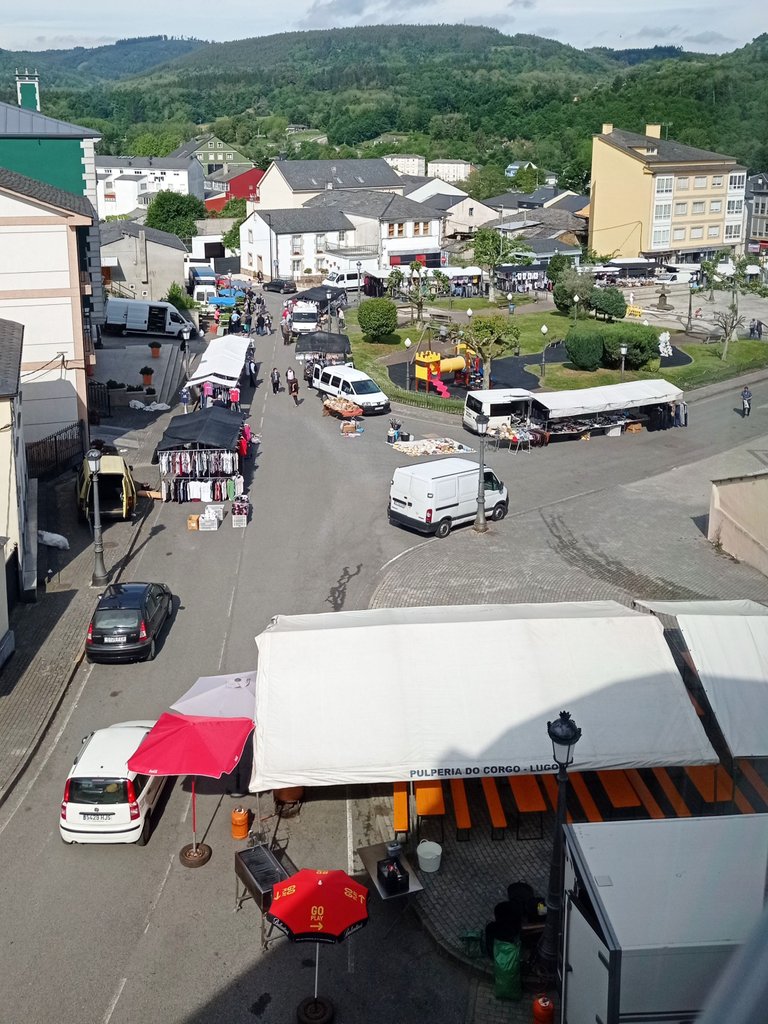
Feria/Fair
El pulpo es un plato festivo hecho con pulpo cocido entero que está presente en las fiestas, ferias y romerías de Galicia, Sanabria y El Bierzo, de ahí su nombre.
Esos días es común que los vecinos de aldea y parte del pueblo se reúnan, actualicen información sobre sus vidas y pasen un rato distinto con motivo de la feria.
También hay ventas de productos para los huertos familiares, ropa y complementos, pan artesanal y no puede faltar la visita a los bares o pastelería para socializar.
The octopus is a festive dish made with whole cooked octopus that is present in festivals, fairs and pilgrimages in Galicia, Sanabria and El Bierzo, hence its name.
These days it is common for the neighbors of the village and part of the town to get together, update information about their lives and spend a different time on the occasion of the fair.
There are also sales of products for home gardens, clothing and accessories, artisan bread and you can not miss a visit to the bars or bakery to socialize.
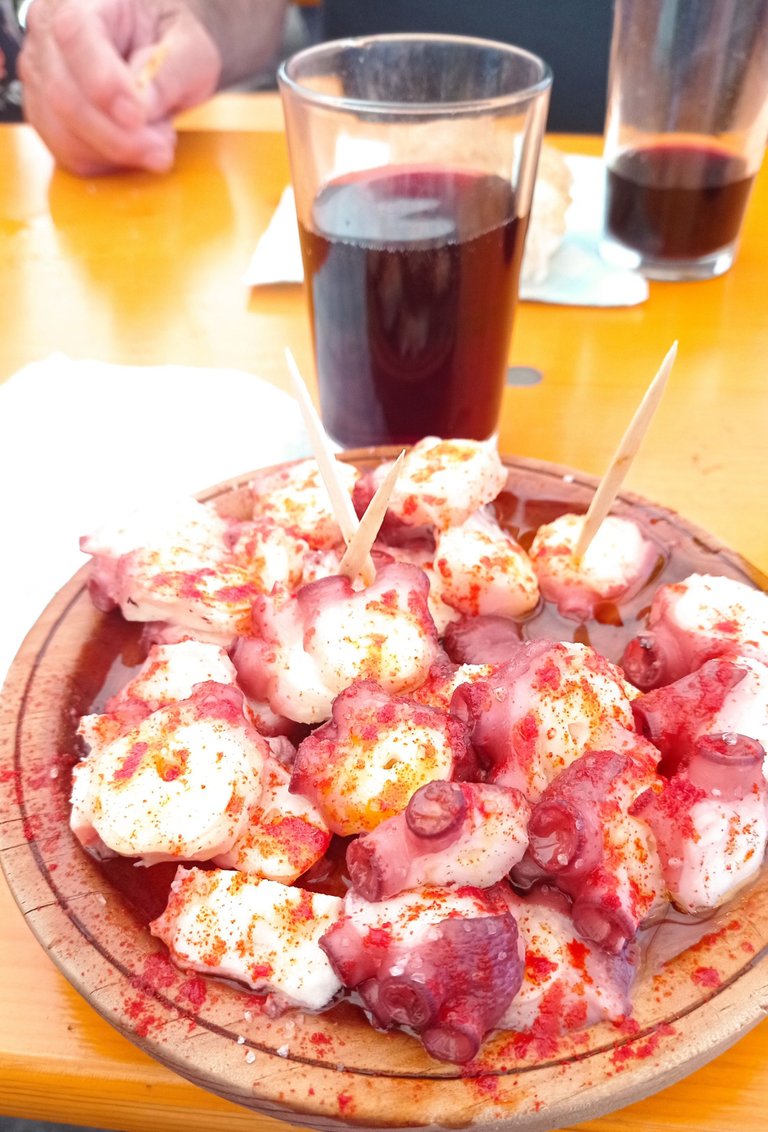
Pulpo en plato de madera para que se conserve caliente/Octopus on a wooden plate to keep warm
La aldea donde viví
Muy cerca del pueblo, está la aldea donde viví. Despertar con el sonido de los pájaros, gallo, vacas y los ladridos del perro cuando llega la panadera, es lo que se vive en una aldea.
A media mañana pasan las vacas de los vecinos camino al prado donde comerán su ensalada de grama por unas horas. Casi siempre acompañadas por uno o dos perros pastores que las guían y las cuidan mientras pastan.
The village where I lived
Very close to town, is the village where I lived. Waking up to the sound of birds, roosters, cows and the barking of the dog when the baker arrives, is what you experience in a village.
At mid-morning the neighbors' cows pass by on their way to the meadow where they will eat their grass salad for a few hours. They are almost always accompanied by one or two shepherd dogs that guide them and take care of them while they graze.
La panadera llega, martes, jueves y sábados. Aunque no se coman todo el pan, igual cada vez que viene, agarran pan fresco. Hay temor de que no vuelva a pasar si no le agarran pan cada vez que viene.
El perro de la casa se encarga de avisar de su llegada, al igual que la llegada del cartero, el señor del gas, compradores de cobre, vacas y todo lo que perturbe el silencio del perro, Bobby.
Se llama aldea por el tamaño y menor extensión que un pueblo, y depende de este administrativa y judicialmente. Hay huertos familiares, pocos habitantes, casas, establos, granjas, árboles frutales, molinos y con agua de manantial.
The baker arrives, Tuesdays, Thursdays and Saturdays. Even if they don't eat all the bread, every time she comes, they still get fresh bread. There is fear that it won't happen again if they don't get bread every time she comes.
The dog of the house is in charge of warning of his arrival, as well as the arrival of the letter carrier, the gas man, copper buyers, cows and everything that disturbs the silence of the dog, Bobby.
It is called a village because of its size and smaller extension than a town, and depends on it administratively and judicially. There are orchards, few inhabitants, houses, stables, farms, fruit trees, mills and spring water.
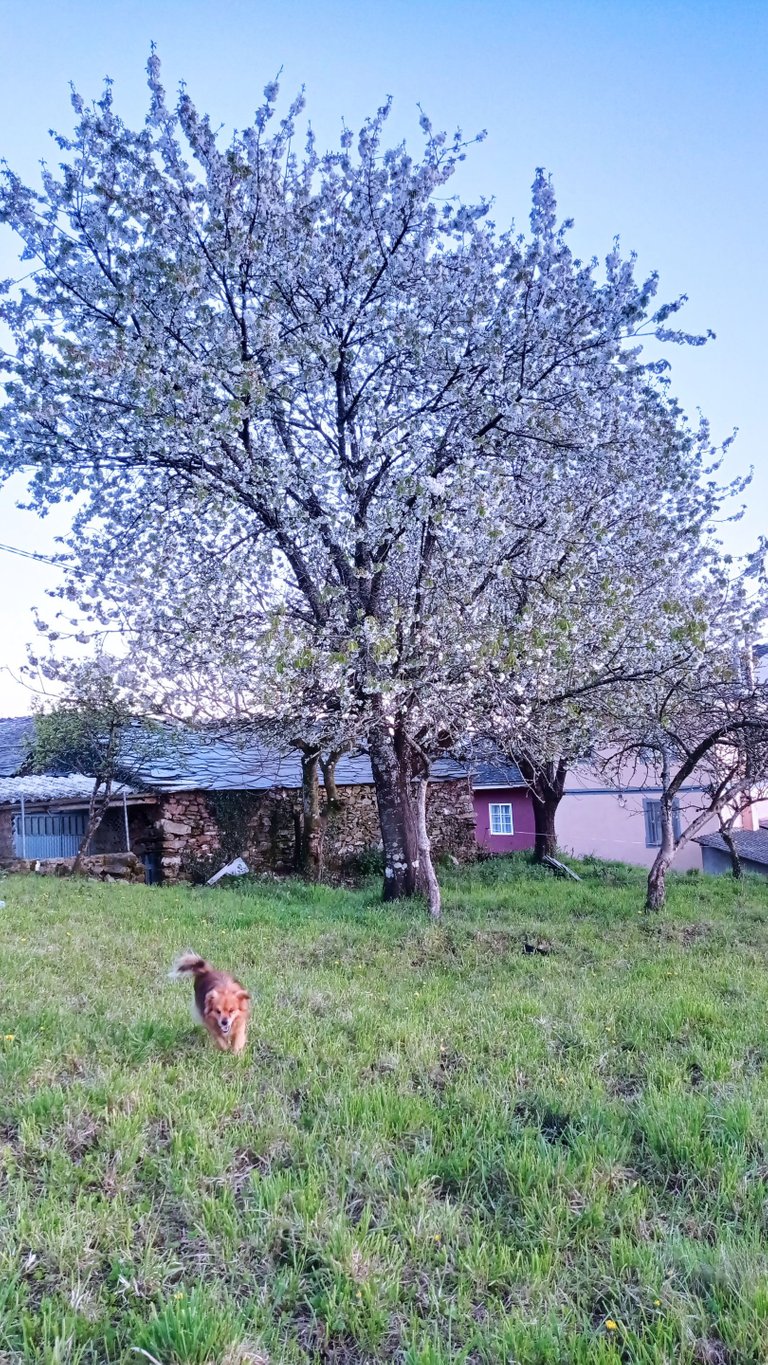
Árbol de cerezas, Cerezo y Chispas, perro compañero de Bobby/Cherry Tree, Cherry and Sparks, Bobby's companion dog
Hace años, era mucha la población en estas aldeas. Al caminar cuentan que se encontraban a vecinos fuera de sus casas, con los que charlaban un rato. En las fiestas, bailaban, jugaban las cartas, hacían reuniones para matar a un cerdo, hacer chorizos, y repartir entre ellos las piezas para que todos tuvieran su parte por colaborar en la elaboración.
Hoy en día, hay pocos habitantes, pequeños ganaderos que crían vacas de raza parda gallega, ovejas y/o cerdos, dueños o trabajadores de negocios en el pueblo o cercanías, familiares a cargo de una persona dependiente, emigrantes retornados como mi suegra, personas nacidas en la aldea que tienen segunda residencia en otras ciudades o países, y algunos inmigrantes como es mi caso.
Otros se fueron a vivir a diferentes ciudades, fallecieron y sus casas quedan solas durante muchos meses, ya que los familiares vienen solo en Semana Santa o verano, otras casas cayeron totalmente en el abandono y quedan solo restos.
Years ago, there was a large population in these villages. When walking, they tell that they would meet neighbors outside their houses, with whom they would chat for a while. At parties, they danced, played cards, held meetings to kill a pig, make chorizos, and distribute the pieces among them so that everyone had their share for collaborating in the elaboration.
Nowadays, there are few inhabitants, small farmers who raise Galician brown cows, sheep and/or pigs, owners or workers of businesses in the village or nearby, family members in charge of a dependent person, returned emigrants like my mother-in-law, people born in the village who have second homes in other cities or countries, and some immigrants like me.
Others went to live in different cities, died and their houses are left alone for many months, as relatives come only at Easter or summer, other houses fell into total abandonment and there are only remains.
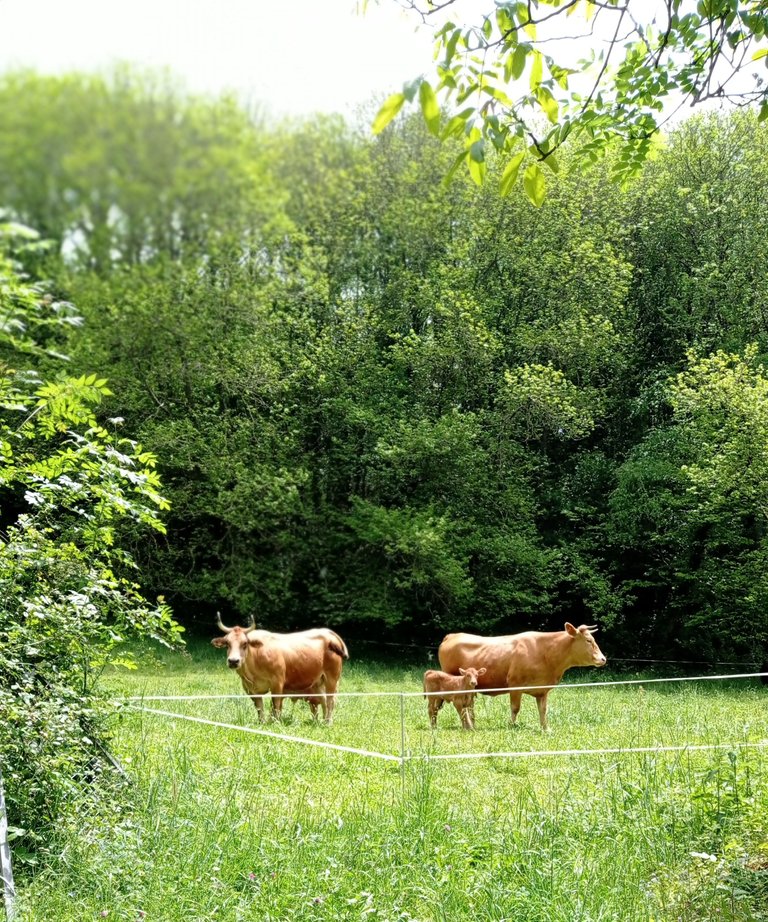
Actualmente vivimos en el pueblo, tenemos todos los servicios básicos cerca, un parque espectacular para caminar,tomar fotos y vamos a la ciudad por trabajo y a compartir con amigos de vez en cuando. Esta es la vista desde el apartamento donde vivimos, tomada en invierno del año 2020.
Currently we live in the village, we have all the basic services nearby, a spectacular park to walk, take pictures and we go to the city for work and to share with friends from time to time. This is the view from the apartment where we live, taken in winter 2020.
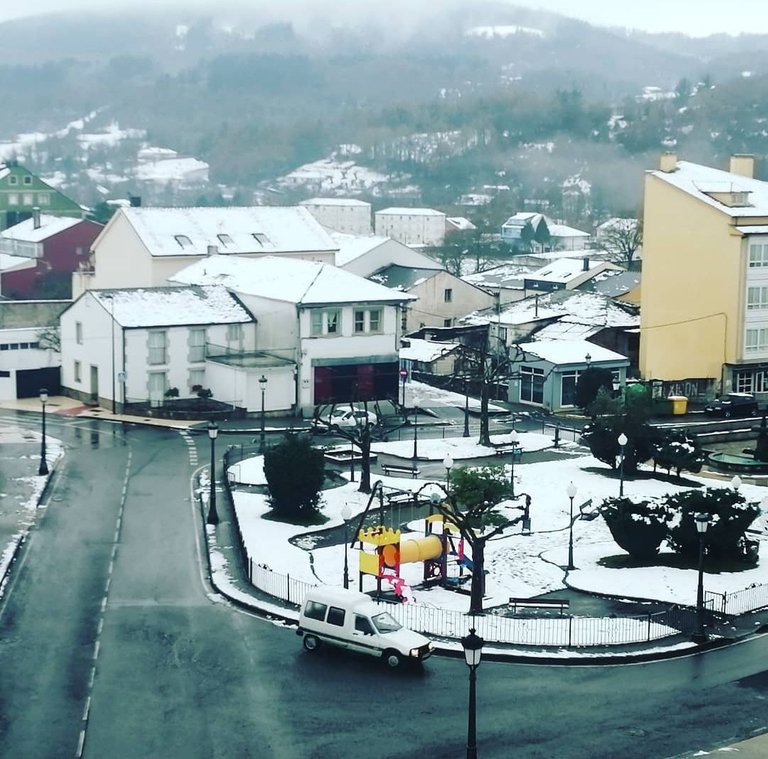
Congratulations @betzaidag! You have completed the following achievement on the Hive blockchain and have been rewarded with new badge(s):
Your next target is to reach 50 upvotes.
You can view your badges on your board and compare yourself to others in the Ranking
If you no longer want to receive notifications, reply to this comment with the word
STOPSupport the HiveBuzz project. Vote for our proposal!